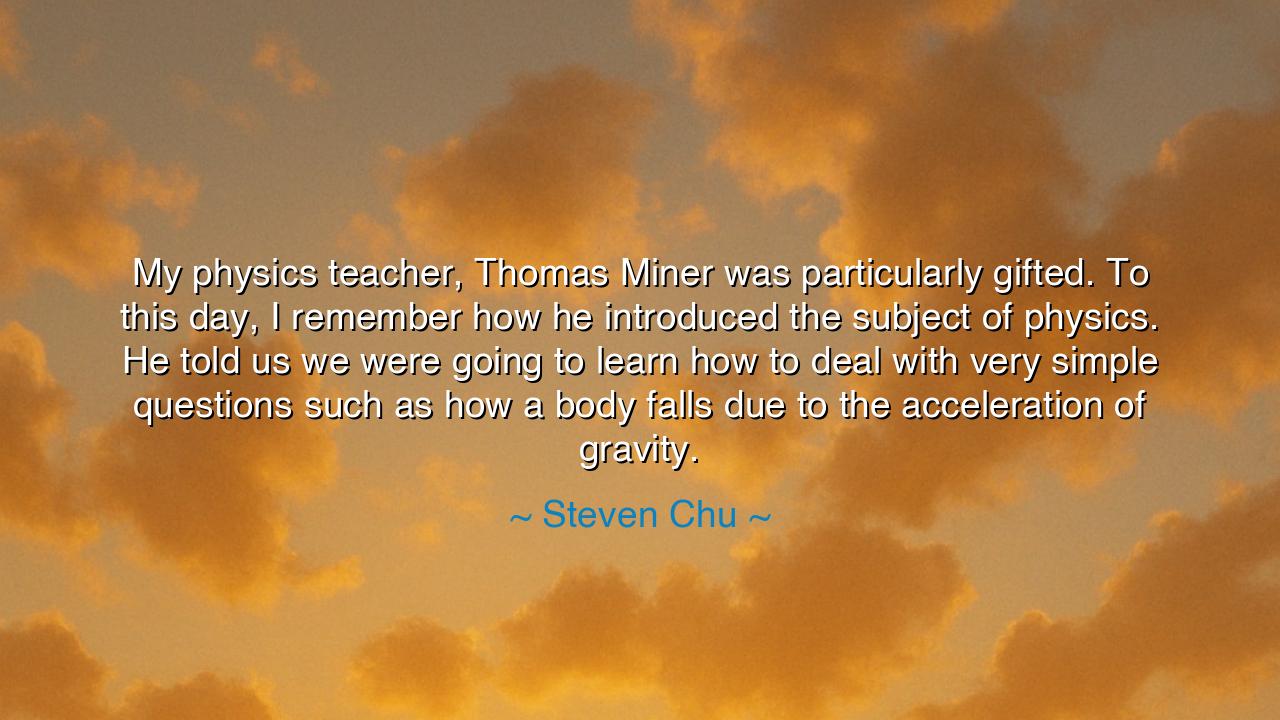
My physics teacher, Thomas Miner was particularly gifted. To
My physics teacher, Thomas Miner was particularly gifted. To this day, I remember how he introduced the subject of physics. He told us we were going to learn how to deal with very simple questions such as how a body falls due to the acceleration of gravity.






In the remembrance of Steven Chu, Nobel laureate of science, there resounds the noble confession: “My physics teacher, Thomas Miner was particularly gifted. To this day, I remember how he introduced the subject of physics. He told us we were going to learn how to deal with very simple questions such as how a body falls due to the acceleration of gravity.” These words, though spoken in gratitude, contain wisdom as ancient as philosophy itself, for they remind us that greatness often begins with the guidance of a teacher, and that truth itself is revealed not through lofty speeches, but through the humble unraveling of the simplest questions.
To call Thomas Miner “particularly gifted” is to recognize a sacred art: the art of teaching. For a teacher’s gift is not measured by the complexity of knowledge he holds, but by his ability to awaken wonder in the hearts of the young. Miner, like a craftsman of the soul, did not burden his students with equations alone; instead, he led them to see that even the fall of a body—a stone, an apple, a raindrop—contained within it the mysteries of the cosmos. The gifted teacher does not close the door of mystery with answers, but opens it wider with the right questions.
Consider how the subject of gravity has inspired some of the greatest minds in history. When the young Isaac Newton, in solitude, beheld the apple fall, he did not dismiss it as common. Instead, he asked the eternal question: why should the apple fall straight toward the earth, and not sideways or upward? From this simple observation, he unraveled the law that binds not only apples to the soil but planets to the sun. In like manner, Chu’s teacher invited his students to approach science not as dry calculation, but as living wonder—the same wonder that once stirred Newton beneath his apple tree.
It is telling that Steven Chu, who would rise to the heights of knowledge, still remembers that first introduction. For the lessons that endure are not always the most complex, but those that ignite the spirit. The physics teacher planted in him not merely formulas, but a way of seeing the world: that truth is found in simplicity, that even the humblest fall of a body is a question worthy of thought. Such is the true gift of a teacher—to leave an imprint not on the memory, but on the very way the mind perceives reality.
History gives us many such examples. Recall Archimedes in his bath, who perceived the principle of displacement not in a grand palace, but in the rising of water as he stepped into the tub. Or Galileo, who looked at the swinging of a church lamp and discovered the law of pendulums. These masters, like Miner, revealed that the greatest revelations are often hidden in the smallest motions. To see them requires not only intelligence, but a childlike openness—a gift that the wise teacher awakens in his pupils.
From this teaching, let us draw the lesson that we must not overlook the power of simple questions. Too often, men seek wisdom in what is obscure, while ignoring the mysteries beneath their feet. The fall of a body, the flight of a bird, the rising of the sun—these are not trivialities, but eternal lessons awaiting a mind willing to listen. Therefore, cherish the teachers who point your gaze not to distant stars alone, but also to the apple falling at your feet, for they remind you that the infinite is found in the everyday.
In practice, let each one of us seek to become both student and teacher. As a student, train your eyes to see wonder in simplicity, never dismissing a question as too small. As a teacher, strive to awaken curiosity, not by overwhelming with detail, but by igniting a flame of inquiry. For knowledge gained through compulsion fades, but knowledge born of wonder endures for a lifetime.
Thus, the words of Steven Chu echo through the ages: a great life in science began with a teacher’s gift, with the simple unveiling of gravity, with the courage to see majesty in the common. And the lesson stands: honor your teachers, seek wisdom in the small, and remember that the greatest truths often fall gently before you, waiting only for you to notice.






AAdministratorAdministrator
Welcome, honored guests. Please leave a comment, we will respond soon